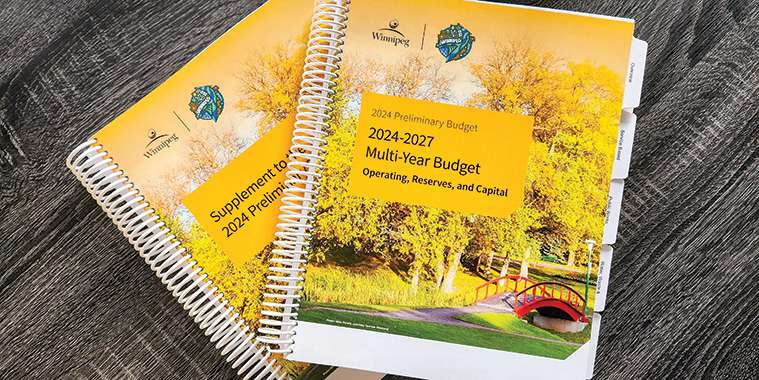Earlier this month, Mayor Scott Gillingham and his Chair of Finance, Councillor Jeff Browaty, tabled the City of Winnipeg’s second ever multi-year balanced budget, the Preliminary 2024-2027 Multi-Year Balanced Budget. It is the first multi-year balanced budget guided through the lens of City’s Council’s 2023-2026 Strategic Priorities Action Plan which reflects Council’s key priorities and actions for their four-year Council term.
The Strategic Priorities Action Plan aims to create even greater alignment between the will of Council and the public service to address key issues such as downtown development, economic growth, livability, sustainability, and improved customer service. The City’s ultimate goal is to focus and prioritize these key themes and actions so Winnipeg can become a stronger, more compassionate city for all residents.
The City’s press release on the Preliminary 2024-2027 Multi-Year Balanced Budget identified a few examples where it responds to the Strategic Priorities Action Plan priorities:
• A 45% increase to the Urban Forestry budget aimed at tree pruning and planting.
• A new library in Northwest Winnipeg, as well as expanded hours at select libraries and security upgrades.
• Three Neighbourhood Action Teams by 2026 to address maintenance issues and an increase to the 311-service budget.
• A capital fund for Winnipeg’s arts institutions and a new mandate for CentreVenture.
• Almost $1 billion for road renewal and active transportation enhancements over 6 years.
Some noteworthy highlights of the Preliminary 2024-2027 Multi-Year Balanced Budget include:
• 3.5% increase to property taxes.
• $138M for Regional Street Renewal projects in 2024 and $629M from 2024-2027.
• $12M for CentrePort water and sewer work.
• $5.2M for Trade Route Corridors Planning and Design in 2026.
• Improvements to the Permit Department:
• Increase of 10 Full Time Equivalents (FTE) in 2024 and up to 38 by 2027.
• $1.25M for customer service improvements at 311.
• Continued support for the Naawi-Oodena development.
• $2M for a new Communities Fund for Councillors to support neighbourhood recreation or community improvement projects. $6.9M in capital funds from 2026 to 2029.
• $2M/year for the Community Centre Renovation Grant Program.
• Winnipeg Transit Master Plan – Primary Network implementation in 2025.
• Snow clearing increase from $36M in 2023 to $52M in 2027.
• $20M Spray Pad Investment Program to open 10 new spray pads.
• 45% more funding for Trees by 2027.
It was reassuring to note the work underway in concert with the Province of Manitoba and stakeholders to see the introduction of a ‘housing first’ model to address homelessness and operating funds included for CentreVenture with mention of a pending Council debate on a new mandate that would likely target Downtown housing.
The drafting of a multi-year balanced budget requires more effort at the start of the process to identify a sustainable and balanced four-year plan with an annual review through Budget Updates to adjust based on priorities or new funding that may have presented themselves over the course of a year. The process enables a longer-term approach to addressing the City’s needs while creating a better plan for service and infrastructure requirements. A multi-year budgeting process can bring a more consistent and strategic financial plan that provides greater certainty and predictability for property taxpayers.
The 2020-2023 multi-year balanced budget, the City’s first, was put to the ultimate test when the global pandemic created unexpected costs and lost revenues which had an immense impact on the City’s finances. As Mayor Gillingham noted in a press release highlighting the challenges of the 2024-2027 multi-year balanced budget, the City had to deal with over $240 million in unexpected costs and lost revenue as a result of the pandemic. The Preliminary 2024-2027 Multi-Year Balanced Budget letter notes that the pandemic ‘created the single greatest disruption to City operations since the 1950 flood.’ It is reasonable to suggest that the City might have been in worse shape had the 2020-2023 multi-year balanced budget not been in place.
As we’ve noted previously, stable, sustainable budgeting at the municipal level is important because it can ensure value for property owners who fill a municipality’s property tax base. A low cost of living, one of the lowest average municipal tax bills among major cities in Canada, and a consistently affordable real estate market continue to help make Winnipeg an attractive place to live, work and play.
As this year’s budget process unfolds, I encourage any residents who wish to provide feedback, either in writing or in person, to follow the instructions found by scanning the QR code below.
Jeremy Davis is the Winnipeg Regional Real Estate Board’s Director External Relations & Market Intelligence.



